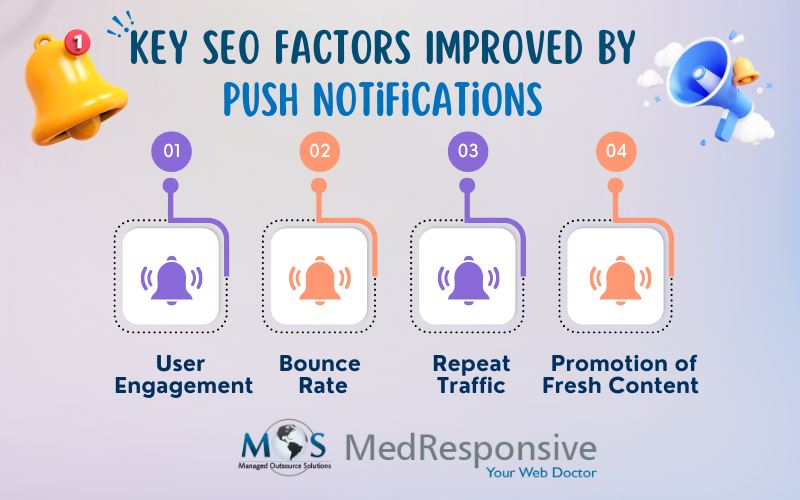What are Push Notifications?
Push notifications are brief, targeted clickable prompts that are pushed to appear in a user’s device, both desktop and mobile in real-time. These messages can include elements such as texts, images, logo, and buttons, designed to direct users to your website. Push alerts are strictly a user-permission based direct communication system delivered with the help of push notification service providers. Companies can utilize digital marketing services to leverage push notifications and stay relevant in a competitive market.
Push notifications enable businesses to engage with users by sending timely, relevant updates such as news alerts, limited offers, and upcoming events. One unique and positive characteristic of these notifications is that they are subscription based and users don’t have to actively browse the website to receive them. By delivering visually-appealing, meaningful ad content to the right audience at the right time, firms can increase purchase intent by 15% and click-through rate by 30% (Think with Google).
They are utilized by brands for various business activities such as:
- Retargeting
- Cross-selling
- Up selling
- Sales promotion
- Brand awareness
How Push Notifications Impact SEO
Although these automated messages do not directly affect SEO and aren’t indexed by search engines, they have emerged as a powerful tool to enhance SEO metrics when used wisely. Let’s go through the several benefits of push notification that influence your SEO efforts and results.
- User Engagement
Push notifications help to keep your audience engaged with the latest news, services or products launched by your company, fostering immediate visibility and communication. They enhance various visitor engagement indicators such as page views, visit duration, repeat visitors, and visitor conversions. According to mobiloud, push notifications lead the average click-through rate by 10%, with sms and email lagging behind at 8% and 1%, respectively. Using remote notifications strategically can therefore boost traffic and time spent on a page which can boost your natural SEO. Search engines highly value credibility and authority for ranking purposes, so improved user engagement metrics can signal your site’s content relevance to search engines.
- Bounce Rate
Although Google stated that they don’t consider bounce rate a ranking factor, a study from Semrush observed correlation between bounce rate and Google rankings. The bounce rate measures the percentage of users that enter a website for a single-page session and return back to SERP with no action taken. Strategic remote notification practices are beneficial to reduce bounce rate by reminding visitors to continue browsing your website.
Businesses can take data collected from their websites to send notifications for situations such as product arrival, time-limited discounts, or even new blog posts. Since subscribed users are already familiar with your website, push notifications can significantly reduce bounce rates. The impact of using push notification was proven in a study by Koovs, an online fashion store, that saw a decline in bounce rate by 12%.
- Repeat Traffic
Repeat traffic is a crucial element for SEO as it signals the relevance and helpfulness of your website content to search engines. Google considers user experience for ranking purposes, and websites that demonstrate their content is valuable to users are prioritized by search engines. An increase in repeat visitors can also lead to longer session durations and pages per session for a website, which can translate to better ranking.
By keeping their visitors updated with the latest information through remote notification, companies can foster conversions and customer loyalty. Consumers who revisit and build regular interaction with your website can also strengthen retention metrics such as customer retention rate, repeat purchase rate, and renewal rate.
- Promotion of Fresh Content
Google favors websites that publish high-quality, fresh content consistently. It implemented the Freshness Algorithm in 2011 to with the aim to provide users with fresher, more recent search results. Obviously, the intention was to place greater emphasis on the importance of up-to-date content in sites that publish news, reviews, or seasonal events. Another specialized algorithm, known as Query Deserves Freshness, is aimed to generate search results with current information for trending topics. These algorithms underline the importance of providing fresh, accurate content for users.
Advanced remote notifications can help to notify your fresh content to existing users for accelerating traffic and indexing of your website. Although new content does appear high on SERP, the rank will lasts only as long as it drives organic traffic. Websites can achieve higher organic traffic by being featured on Google Discover, which helps expand their reach. Remote notifications can help you get into Google Discover by promoting your new content to available users. Businesses can publish fresh content for new product descriptions, reviews, or update existing content and notify users through push notifications.
Best Practices for Push Notification
Let’s delve into best practices for effective push notification implementation that can enhance overall SEO results for your company:
- Utilize a data-driven approach to segment your audience based on past behavior, preferences, and demographics. Businesses can create user segments to target qualified leads for driving engagements and conversions.
- Craft compelling personalized messages to users that cater to their individual preferences and interests. Personalization is the key to resonate with your target audience by tailoring messages based on past purchase, browsing history, and location of the users.
- Perhaps two most critical factors of push notification is the timing and frequency at which they are sent to users. Excessive use of push notification may annoy and be perceived as an intrusion to your users, which may lead to opt-outs. Analyze user behavior and deliver timely, informative updates for increasing user engagement and conversions.
- Implement automation to streamline web and mobile notification processes by automatically sending scheduled messages at optimal frequency maximizes the effectiveness of your push notification campaign. Automation can also help to adapt and scale your ad campaign according to the growth of your business and increase audience reach.
- Craft short, compelling and clear content in your web and mobile notification such as an attractive call-to-action that creates a sense of urgency to encourage clicks and site visits. Ensure that your push notification is optimized for different devices with faster loading times and enhanced performance.
- Push notifications aren’t a one-time effort but rather require continuous testing and experimentation of various elements such as different messages, timing, and personalization options. A/B testing helps compare between numerous versions of your push notifications, allowing you to choose the type that performs best with your audience.
- Monitor and analyze your remote notification performance regularly with a robust analytics platform such as Google Analytics, PushEngage and OneSignal. Implement a tracking code program for capturing user activity and data collection. Analyze key metrics such as click-through rates, subscription rate, and conversion rate to identify areas of improvement and implement corrective measures.
Unlock SEO Benefits with Push Notification
Remote notifications are often underutilized but a powerful tool essential to boost user engagement, drive traffic, and website performance. Integrating best practices for push notifications to complement your SEO strategies can enhance the results of your overall digital marketing efforts. By following best practices for push notifications, companies can maximize the effectiveness of push notification for a robust online presence. As the dynamic digital landscape continues to evolve, enlisting the services of search engine optimization company can help deliver customized remote notification services and ultimately boost your search engine result page (SERP) ranking.





